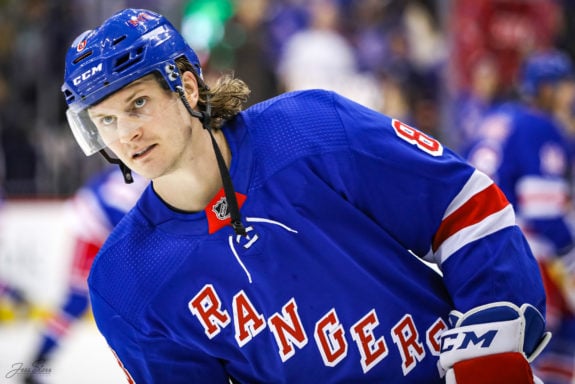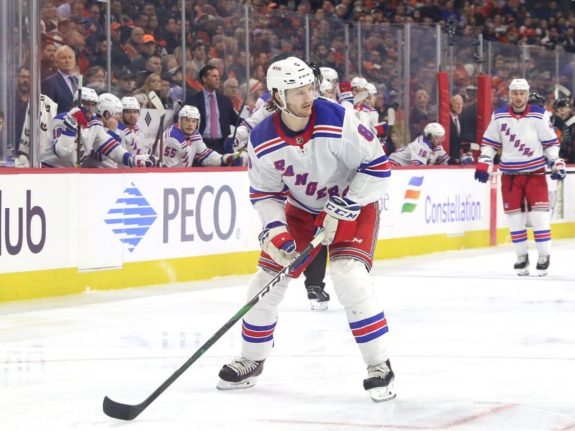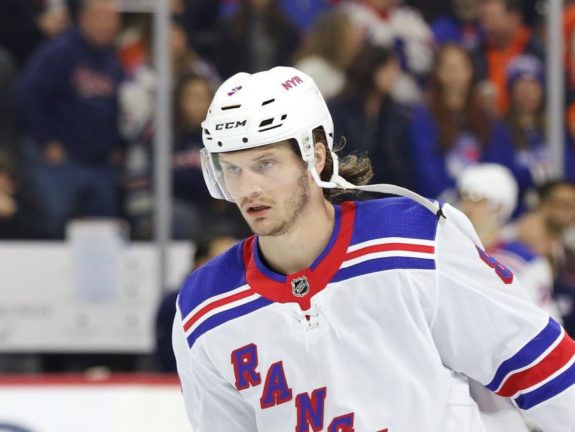We are far from the days of the Broad Street Bullies of the 1970s. The NHL is also different from the 90s version when clutch-and-grab and the left-wing lock were the way to win, and if you hit somebody clean, you didn’t have to defend yourself for it. The only time that happened was after a cheap shot, not playing the game the way it was supposed to be played: hard, fast and clean.
However, the NHL is probably the best it’s ever been. Skilled players have the room to make amazing plays, and coaches give them so much more leeway than in the past. The speed of the game is ferocious and exciting. But there’s one nagging problem.
The New York Rangers’ Jacob Trouba has belted out several hits this season. On more than one occasion, he stepped up and popped an opposing player who had their head down and had to fight immediately after. That’s wrong. Sure, players should stick up for their teammates, especially their stars. But the way players react to just about every clean hit these days is disconcerting and often frustrating.

Hockey is an amazing game. With the speed and talent that’s out on the ice these days, it’s hard not to love, and the odd scrap is good for the game; it’s part of it and serves a purpose. Most fans and players understand that. But believe me, none of the players want to see others get seriously injured, no matter what. That said, it’s still hockey. It has its own set of rules and, like other sports, its own etiquette. Fighting is and should be part of the game to keep stick work down and prevent dirty plays.
Trouba, Khaira & Stillman
On Dec 7, 2021, Trouba, a 6-foot-3, 208-pound defenseman from Rochester, MI, stepped up and laid a hit on the Chicago Blackhawks’ Jujhar Khaira. Khaira, a 6-foot-4, 212-pound forward, was attempting to come out of the Blackhawks’ zone, looking for the puck with his head down. It was a hard hit, and Khaira paid the price for it. Immediately after, there was a skirmish centered around Trouba, but no fight ensued. However, when Trouba stepped on the ice five minutes later, he was greeted by Riley Stillman, who dropped his gloves, and Trouba had to defend himself. Stillman jumped Trouba as soon as he came off of the Rangers’ bench and didn’t receive an extra two penalty minutes for instigating the fight.
Let’s be clear. It was horrible to see Khaira lying on the ice like that. No one wants to see that, and Trouba certainly didn’t want that to happen. However, it was a clean hit. There was no penalty on the play, and he wasn’t suspended after further review.
“Obviously very scary and unfortunate,” said Trouba. “I exchanged text messages with him after and checked in. He tells me he’s doing okay, so that’s good to see. Obviously, no one wants to see that, and no one plays the game to see guys get injured or injure guys. It was very unfortunate. It’s a tough situation for everyone, and I hope he recovers fast.”
Let’s hope, despite a history of concussions, Khaira doesn’t have any long-term effects and is able to continue to have a successful career. Trouba finished by saying, “I don’t think it was malicious. I don’t think I jumped — stayed on my feet, tried to tuck my shoulder in, and put it in the chest. That’s how I was taught how to hit. That’s the cleanest way I know how to hit. That’s what I try to do. I don’t think I have a reputation as a dirty hitter. I play the game hard. I play pretty close to the edge, but I try not to go over the edge.”
Trouba, MacKinnon & Landeskog
The Rangers traveled home the next night to face the Colorado Avalanche, and Trouba made another big, clean hit. He laid out Avalanche superstar Nathan MacKinnon, who had his head down in the slot. MacKinnon got up and went straight off the ice while Trouba had to defend himself again. Avalanche captain Gabriel Landeskog engaged Trouba, and the two had a spirited tilt. Landeskog is no slouch. At 6-foot-1, 215 pounds, he’s big and powerful.
He was also doing what he felt a captain should do. Their star player was hit hard; he had to do something about it. It’s hard to blame him. However, it’s a recent trend that seems to be at its worst this season. Players are playing the game the right way — hard, fast, and clean — but consistently have to defend themselves. Plus, it’s not as though Trouba was picking on smaller players that are the size of Artemi Panarin. MacKinnon is a solid 6-feet, 200 pounds, and skates like a freight train. The hit happened about halfway through the second period, and MacKinnon returned after clearing concussion protocol in the third.
Trouba’s Next Two Games
The next game saw the Blueshirts take on the Buffalo Sabres, and Trouba had another big, clean, open-ice hit. This time he wasn’t forced to fight after, but in the following game, against the Nashville Predators, he had a couple more big hits. One on Philip Tomasino, in the first period and late in the second period, he popped Luke Kunin. After the hit on Kunin, the Predators were trying to get Trouba to fight, but it was a tight game, and Trouba refrained. The Rangers got a boost from his hard-nosed play and outshot Nashville 16-5 the rest of the game.

Trouba’s defensive partner K’Andre Miller said this of his teammate: “Troubs has been unbelievable. He’s bringing a physical presence to his game every night. Guys are finding out they’ve got to keep their head up coming through the neutral zone.” Fellow alternate captain Chris Kreider said, “Jake’s been doing that a lot for us lately. It seems like those [hits] are just perfectly timed. Maybe when we’re not playing as north-south as we should, not getting into bodies. And yeah, it definitely gets the bench going when he steps up and hits someone as clean and as hard as that.”
The Instigator
The infraction for instigating came to the forefront of the NHL rulebook in 1992. Fighting was out of hand in the mid to late 80s, and the league wanted to do something about it, so they implemented or amended the instigator rule. If someone deliberately instigated a fight, they received a game misconduct. They modified the rule in 1996 so that the offender could be assessed an extra two-minute minor penalty, along with five minutes for fighting and, if the referee saw fit, an extra 10-minute misconduct.

The rule created a bit of a problem because NHLers often police themselves: You get your stick up; you might have to fight. You hit someone from behind; you’re probably going to have to drop your gloves with someone who knows how to throw. You take out someone’s knee; lookout. Again, there’s a reason for fighting in the NHL.
Related: Rangers Try to Send Message On and Off the Ice
The problem is that after cheap shots or careless sticks to the face — cutting players, or worse — coaches started instructing players not to retaliate and end up with the extra two-minute penalty for instigating, which hurts the team. So certain players began to feel more comfortable taking liberties, especially against the other team’s skilled players. However, what’s happening now is that the instigator penalty isn’t being called enough when a player is forced to defend himself after a clean hit. It gets called, but rarely.
So What Now for Trouba and the League?
The NHL is played at high speeds between big, strong men. Things happen in an instant, and reactions happen almost as fast. However, players might want to rethink the current culture of making those who play hard and clean defend themselves. These aren’t the only two instances Trouba’s had like this, and he isn’t the only one. In recent years, and especially this season, it’s been happening throughout the league, which sends the wrong message. Instead of sending the message that cheap shots are unacceptable and will be handled, they’re showing that honest play is bad and should be punished.
I reiterate, no one wants to see any player get hurt, whether by a hit or in a fight, but especially not with a cheap shot.